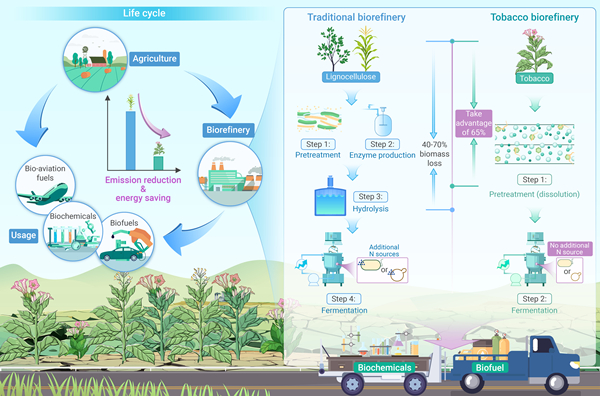New Research Highlights Tobacco’s Potential in Sustainable Bioenergy
Researchers at the Qingdao Institute of Bioenergy and Bioprocess Technology (QIBEBT), Chinese Academy of Sciences (CAS), along with international collaborators, have identified tobacco as a highly promising energy crop for biofuels and biochemicals production, capable of significantly reducing greenhouse gas emissions.
Unlike traditional energy crops, tobacco is characterized by its high content of water-soluble carbohydrates and nitrogen, along with a low lignocellulose level, and can grow on barren lands, making it an ideal candidate for low-energy bioconversion processes.
This study was published in The Innovationon Aug. 16.
Prof. ZHANG Haibo, the corresponding author of this study, and the head of from the System Microbial Engineering Group (SMEG) at QIBEBT, highlighted the applicable and environmental potential of tobacco, stating, "Our study presents an innovative method of biomass conversion by autoclaving tobacco leaves. This process dissolves over 65% of the biomass into a nutrient-rich medium without requiring extensive pretreatment. This medium supports the growth of microorganisms and the production of bioproducts, offering a cost-effective and environmentally friendly alternative to traditional methods."
ZHANG emphasized that using tobacco could cut carbon emissions by up to 76% and reduce energy use by about 81% compared to traditional corn stover during biorefinery processes based on the life-cycle assessment.
Prof. WANG Qian, a co-corresponding author of the study from Tobacco Research Institute, Chinese Academy of Agricultural Sciences, noted, " Tobacco is a field crop with strong stress resistance, high biomass, high protein and high sugars. It has rich metabolic pathways and is easily genetically modified. And it can tolerate soil environments with a salt content of approximately 9‰ and can complete its life cycle on moderately to heavily saline-alkali soils, making it a promising energy crop with outstanding potential for growing on barren lands. Therefore, based on the findings of our study, the ability to replace conventional synthetic media with tobacco medium in microbial fermentation processes is a significant finding. This opens up new opportunities for the industrial-scale production of bioproducts in a more sustainable and cost-effective manner."
The findings suggest that tobacco could play a critical role in the transition towards renewable energy sources, providing a sustainable and economically viable alternative to traditional biofuel crops.
"Our collaborative work on the development of bioprocesses using tobacco leaves to obtain a nutrient-rich medium capable of supporting the growth of microorganisms and production of biofuels, without extensive pretreatment, hydrolysis, or additional supplements is truly significant. By embracing sustainability as a core principle in biorefinery operations, we can contribute to mitigating climate change, reducing environmental impact, and fostering a more sustainable future for generations to come.," Prof. Sang Yup Lee, a co-corresponding author of this study concluded.
This study marks a significant step forward in the development of low-carbon biorefineries and paves the way for future research and policy initiatives aimed at optimizing the use of tobacco in bioenergy applications.

Carbon Emission Life Cycle and Efficiency Comparison: Traditional vs. Tobacco Biorefinery
(Text/Image by WANG Fan)
Contact:
KONG Fengru
Qingdao Institute of Bioenergy and Bioprocess Technology, Chinese Academy of Sciences
Tel: 86-532-58261072
E-mail: kongfr@qibebt.ac.cn